It’s debatable whether horses love people or not. But they definitely feel very big emotion for them and about them. It’s easy to be flattered when a horse pays special attention to you and depends upon just you – even more so than when your dog licks your face!
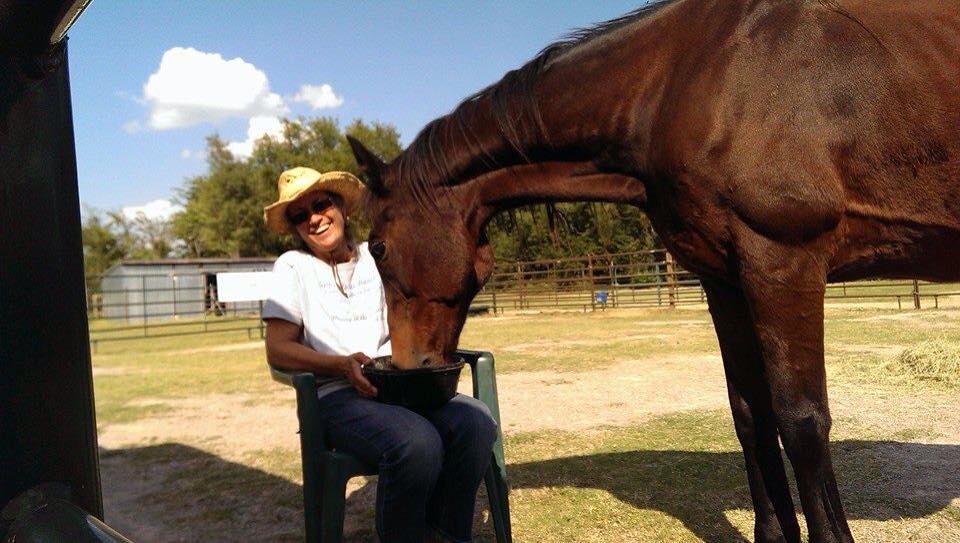
I think this is because the horse is still, by nature, wild, even if it’s been domesticated.
I noticed today for example, my gelding wanted a lot of attention. He stood perfectly still while I brushed my mare, getting her ready for a trail ride, so I went over and brushed him. Before I haltered her, he stuck his head in the halter as if to say, take me!
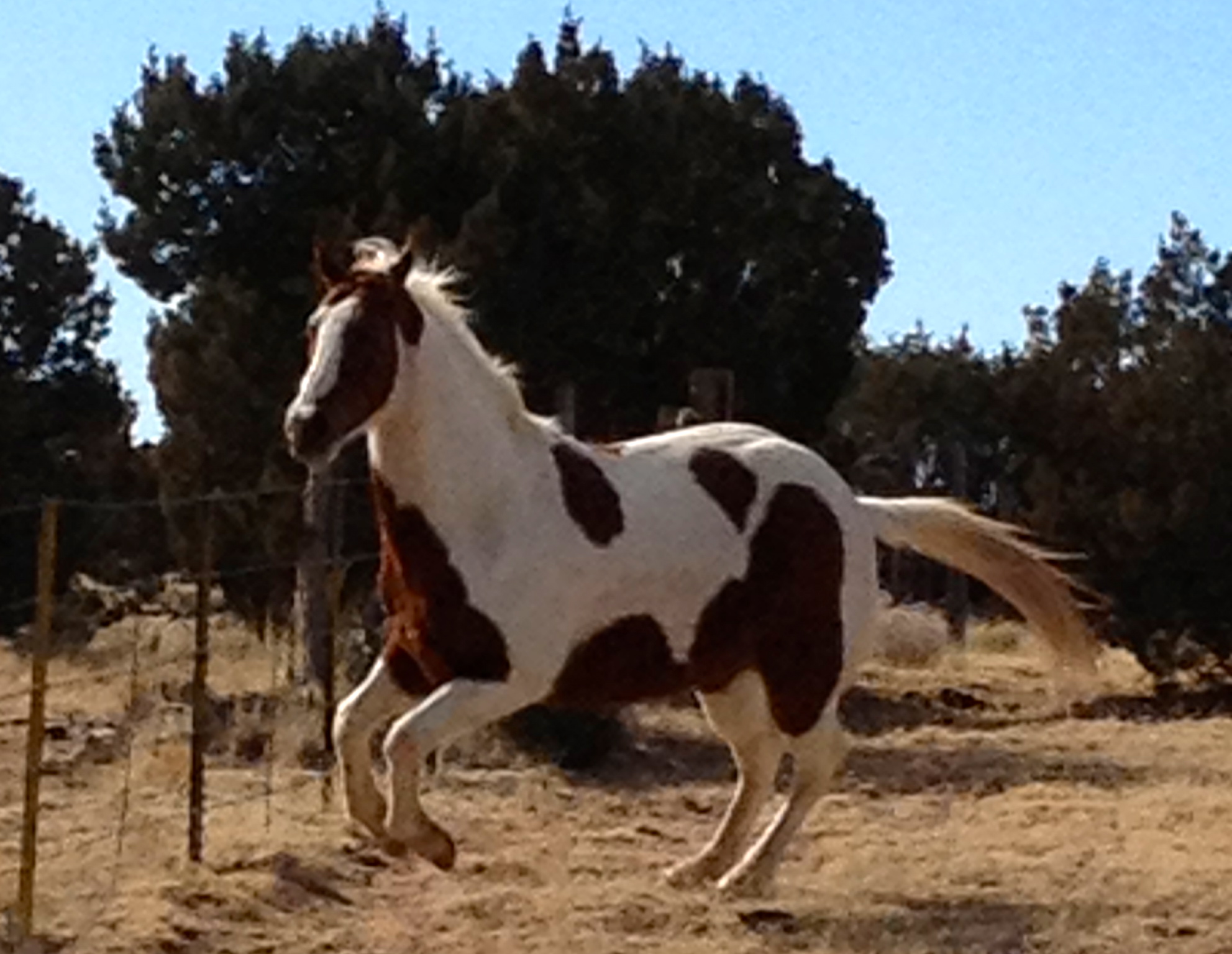 But I didn’t take him on a trail ride as I sensed his energy was quite high. The weather had just turned very cold and some horses get excited during those times. Even though he was so agreeable, I didn’t feel that I should take him out without some groundwork first. I watched what the other horses were doing with him. They kept moving him around. When I finally got around to the groundwork, I found that he wasn’t listening very well. The horses had basically told me that by their actions with him.
But I didn’t take him on a trail ride as I sensed his energy was quite high. The weather had just turned very cold and some horses get excited during those times. Even though he was so agreeable, I didn’t feel that I should take him out without some groundwork first. I watched what the other horses were doing with him. They kept moving him around. When I finally got around to the groundwork, I found that he wasn’t listening very well. The horses had basically told me that by their actions with him.
Maybe, you might say, he would’ve been fine on the trail because that’s what he wanted. It’s possible. But I also could sense that his energy was mercurial, not dependable at that time. What I do with a horse in a case like that is some groundwork coupled with some bodywork, to make sure he is grounded, and in his body. Once he is there, he will be more attentive to his surroundings and to me.
Here are my 10 Lessons in Horse Love:
1) The “love” you think your horse feels for you is not always caretaking love. I’ve spoken a lot about the caretaking abilities of horses. Learn to differentiate:
How a caretaking horse is born
2) Through the Liberty Foundations, you can expose what part of the horse is not connected to you.
3) The kind of bond you need for safety with your horse is not gained by force or by feeding lots of treats.
4) Watch how the other horses view and interact with your horse.
5) Some horses will never be safe to ride, no matter how much you try to tire them out or how much they appear to love you. Women who love their horses too much
6) A horse walking behind you does not “love” you. He or she is herding you.
7) A horse you can’t walk behind is one who is in control.
8) Pain is the number one cause of behavior problems in horses, whether it be emotional, psychological or physical. A vet visit and bodywork are good ways to rule out those problems.
9) Curiosity is one of the most powerful ways to get your horse connected to you.
10) Being needy needs to be replaced with being a leader – what the horse views as a leader.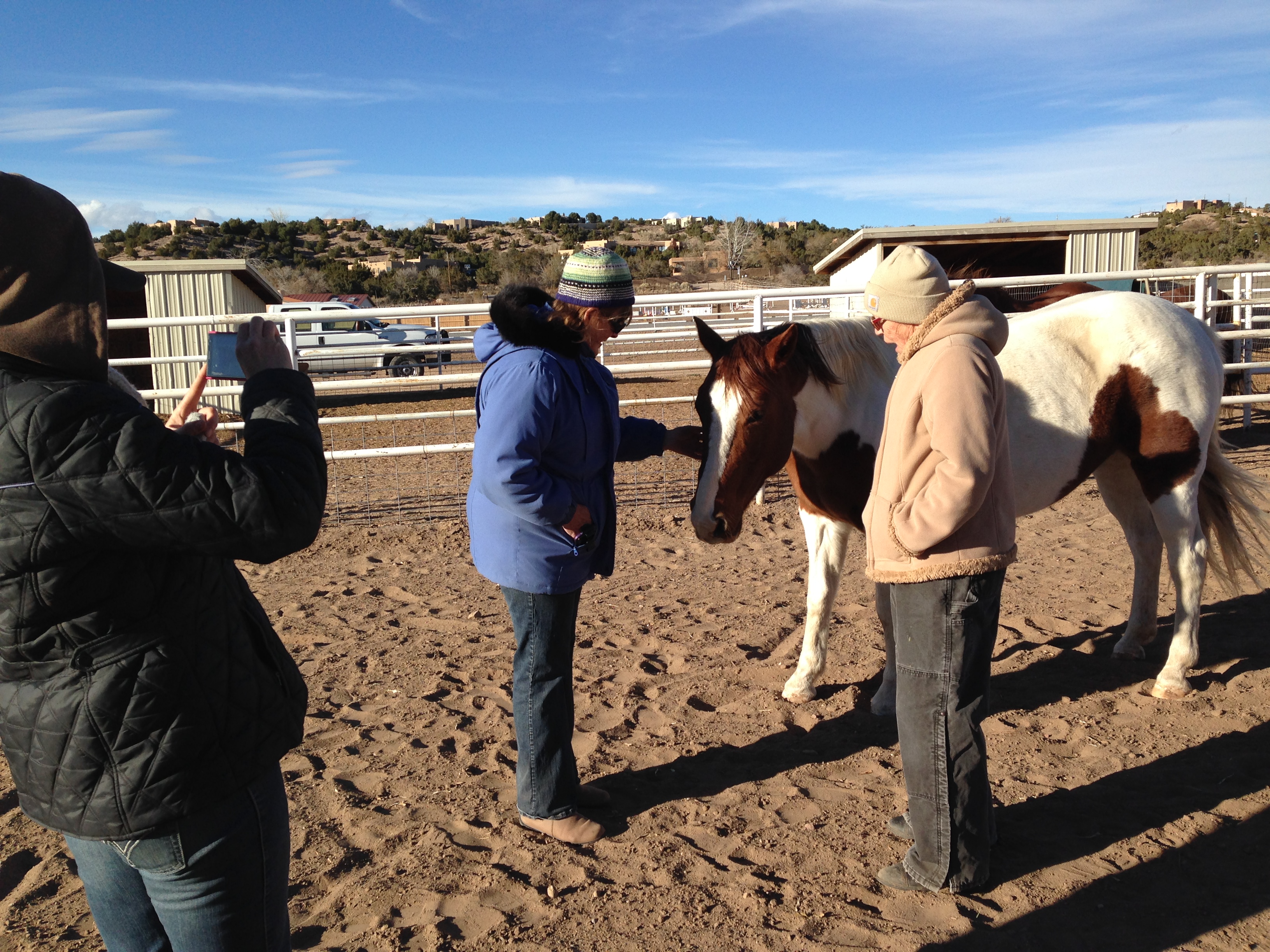
I know some of these things are difficult to hear, and maybe create disagreement in readers, but it’s better to know the truth than be sorry later. The worst accidents I’ve had are because I haven’t listened to my horse – the whole breadth of what he is saying, or I’ve tried to do too much with a horse I don’t know, or I’ve tried to override my underlying intuition.
Although in Liberty Foundations we give our horses a voice, we want them to experience choice in the relationship, we do not want to be at their mercy. Horses’ desires can change in a heartbeat, subject to outside stimuli. Horses can be reliable for the most part and we build more reliability into them with the foundations, but I never think that because my horse will do all these things with me, he won’t suddenly jump out of his skin because he saw a jackrabbit. His DNA is going to override how he feels about me, and at that moment of fright, he probably isn’t thinking about me because he’s thinking of the thing that frightened him.
If I take him out on a trail ride when I sense too much excitement in him, I can either ride and see if he settles down, or work on the calming before I get in the saddle. I think I’d rather work on the calming aspect.
Many people are stunned when their beloved horse pitches them off. They don’t know what happened. I can tell you what happened in every instance that I’ve been booted off. And it was always my fault for not paying attention in some way, or having my energy all wrong.
The Liberty Foundations not only expose the holes in a horse’s training and thinking, they also expose the holes in ours, and the variance of our energy levels. What we project to the horse is profound and influences what he will do next, if he isn’t ignoring us. Ignoring us is another indicator that the horse is not tuned in. Either we have to work on our own energy and where it is and what it’s doing, or we need to get the horse’s attention in some way, or both at the same time.
At one time, I thought all a horse needed was wet saddle blankets, but now I see that through the process of getting wet saddle blankets, there were quite a few bumps a long the way. We developed a relationship through consistency. It could have gone a lot faster and without so much drama if I had taken the time to know my own and my horse’s energies first, and know what he could and couldn’t do.
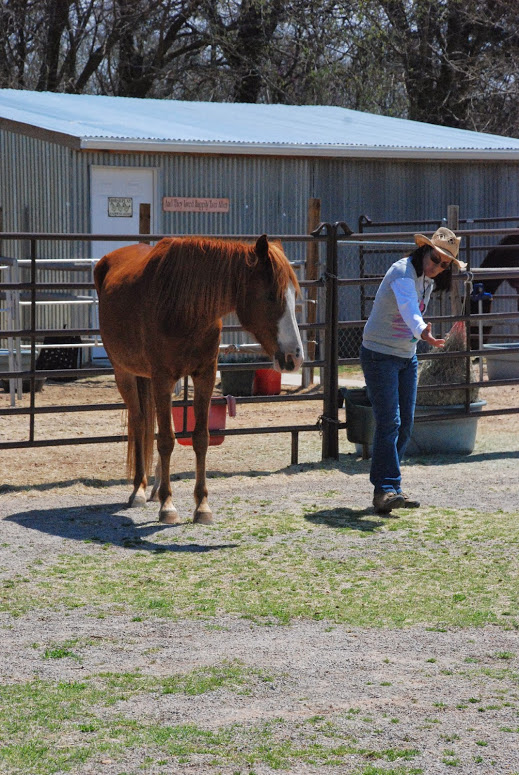 From where ever we are in our journey with horses, there is a path to healing from that point in time. If there is confusion about the event that just occurred, there is a way to find clarity and connection with your horse. What I aim for is a horse that will stay in deep connection to me for longer and longer periods of time, so that his response to outside stimuli will not be dangerously reactive. And so that he has a place to come back to, a calm center with me.
From where ever we are in our journey with horses, there is a path to healing from that point in time. If there is confusion about the event that just occurred, there is a way to find clarity and connection with your horse. What I aim for is a horse that will stay in deep connection to me for longer and longer periods of time, so that his response to outside stimuli will not be dangerously reactive. And so that he has a place to come back to, a calm center with me.
This is very important to the life of horses because, if we can’t train a horse toward being a safe riding horse, then we limit his usefulness to society. If we limit his usefulness, then he has less “value.” If we have too many horses without “value” to the world at large, then we do not have a horse industry. If we have no horse industry, then we do not have economic support for a better world for horses.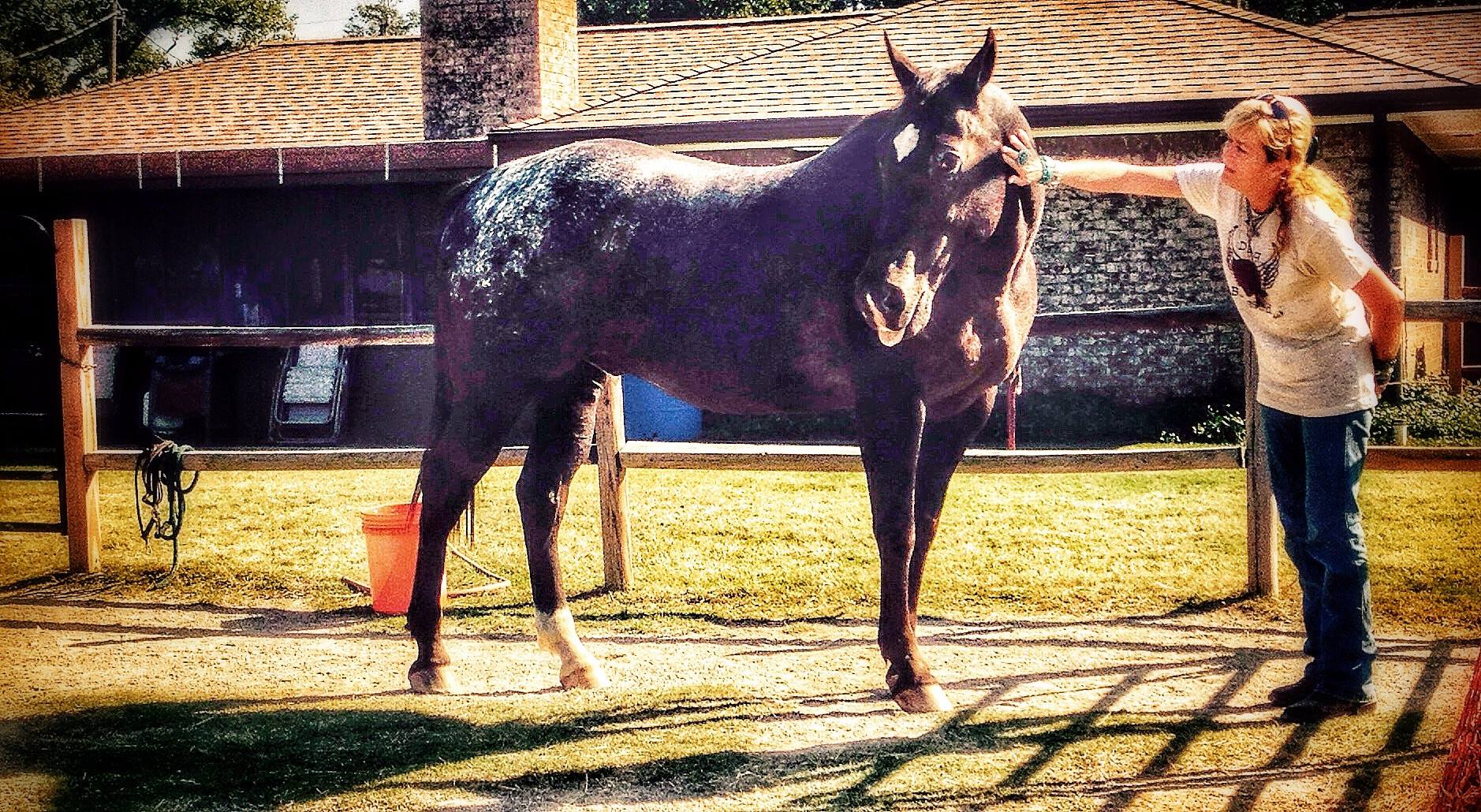
There will always be horses who can’t be ridden, and the numbers are rising because of the sheer volume of rescue horses that have been so neglected, are aged, or have health problems that prevent them from being ridden. For those horses, we bring great value to their lives and our lives are enriched, by taking them on, giving them purpose and a voice in a world that wouldn’t have given it to them otherwise. More and more people who wouldn’t have thought of owning a horse otherwise are bringing home horses. This is giving rise to a new industry, or an industry that may have been dormant before, the “Pet Horse Industry.” These horses still need to have good manners, have engaging activities, as well as food, shelter, safety and companionship.
What this all means is that my 10 Lessons in Horse Love are a way to begin to ensure that your horse gets everything you have to offer to help her be a good citizen and take her place in the world…just as you would do with a beloved child.
*****
(copyright: Susan Smith, OrthoHorse)
Services: Bodywork: (Ortho-Bionomy for people, Equine Ortho-Bionomy): private sessions, tutorials, phone consultations, Horse & Rider sessions, distance healing communication and gift certificates
Liberty Coaching: clinics, mini-clinics, workshops, private and semi-private sessions, tutorials, consultations: by appointment: 505.501.2478 or emailing susansmith@orthohorse.info Scheduling now. Contact me for details.
I’m now putting together the 2015 Clinic Calendar. Let me know if you want to do a clinic at your location. Prices will vary according to location.
Who will benefit from this work?
December 13-14 I will be in DeLand, Florida teaching a Weekend Liberty Clinic. One spot is available, so please register asap if you want to come! An OrthoHorse Tutorial as well as private lessons and sessions will be offered on Friday, December 12th.
Book your spot today! Cost: $325
All horses and humans, but specifically:
- Horses who have not responded to traditional natural horsesmanship
- Horses who have been frightened, abused and in other ways traumatized
- Horses who may be aggressive or too passive in their herd situations
- Horses who have problems with humans
- All humans who may be puzzled about relationship with horses and want to deepen their connection.
January 27-March 10, 2015 – Horses at Liberty Online Advanced will continue the instruction for those students who have taken an introductory online or in-person clinic from me.
The work builds on what has been taught in the introductory course with refining movements, body language, knowing what and when to ask for change, celebrating the horse’s gifts of engagement. Cost: $311
Payment for the Santa Fe 1-Day Liberty Workshop and Advanced Online can be made by check, PayPal or credit card. A PayPal button for each of those events is available on the home page of my website, http://www.orthohorse.info
Susan is a member of the Independent Liberty Trainers Network. libertytrainersnetwork.com/



Yet again, Susan, you gave some very practical tips about moving ahead with horses that all of us can use. You’ve made some very thought-provoking points about the wild nature of the horse and how to work with that.
For the Free Horse,
Ruella Yates
Spirit Horse Ranch